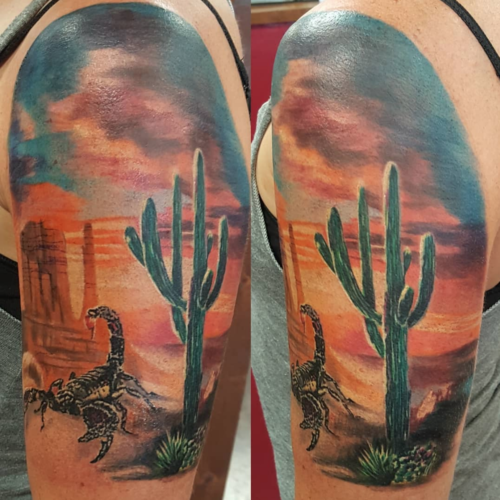
Tattooing in Tucson booms with the help of social media, thrusting the city’s history of great shops and even better artists into the limelight.
Tucson’s tradition of being a military and college town attributes to the tattoo industry’s success in the Sonoran Desert, but reality TV and social media apps such as Instagram are taking tattooing to new heights and new clients.
“Some of the best in the world have come from Tucson, at least some of my favorite artists, and I didn’t even know that they were from here,” said Nicholas Becker a tattoo artist who has been tattooing for the past decade at Fast Lane Tattoo.
Becker said media is the biggest factor in Tucson’s growing tattoo popularity — “it’s produced those shows and it’s given us a lot of attention for what Tucson already has.”
One of the most popular shows for tattooing in recent years is Ink Master, hosted by Spike. It’s a reality show where artists from around the world compete head-to-head on elimination challenges every week with a sole winner gaining the title, “Ink Master,” for having the best, most consistent tattoos throughout the series.
A Tucson local, Anthony Michaels, won Season 7 of the show in 2016. Michaels has worked at Metro Tattoo for the last nine years, and his fame helped grow his cliental from Tucsonans to people from all over the country.
“Social media is the biggest factor,” said Matt Minetta, co-owner of Metro Tattoo. “There’s no way that anyone would know anybody, and it gets bigger and bigger everyday.
“Now I have more people reaching out to me on Instagram than I did three years ago. … I’ve gotten to tattoo more people all through connecting over Instagram.”
Although tattooing has been a successful industry in Tucson for decades, it attracted an entirely different market in the beginning.
“It was mainly for military dudes and circus freaks,” some who were considered “outlaws” and “outcasts,” said Molly McKing, who has worked at Black Rose Tattooer as a tattoo artist for the last four years.
Some of the most prominent styles in Tucson and in Arizona were American traditional and black and gray. American Traditional features bold black line work, a limited color palette, and simplistic Western designs that resonate with sailors and servicemen in the 1950s. In contrast, black and gray tattooing utilizes only black ink, but is diluted with water to create different shades that help accentuate and add detail to the design.
While tattooing still carries its “outlaw” label today, shows such as Ink Master have introduced an entirely new group of clients with a style that differs from Tucson’s tattoo history.
At Fast Lane Tattoo, Becker says that 90 percent of his clients are women aged 18 to 24 who normally come in for watercolor-themed artwork, which he attributes to the growing popularity of color tattoos on TV and social media.
“The biggest thing is the media — it’s produced those shows and it’s given us a lot of attention for what Tucson already has,” Becker said, “A lot of world-renowned artists have come from Tucson, so I would say the number of people who recognize Tucson as a good spot for all tattoos is growing.”
Some artists feel that popularity in tattooing has created an entirely new demographic of clients. Whereas the people of today no longer resemble the old-school biker types who once filled tattoo shops across the city, tattoo enthusiasts now come from all walks of life.
“Ten years ago, when I was tattooing, it was different,” Minetta said. “There were still a ton of people bailing through the … door, but it’s changed and now there’s different types of people bailing through the door. Most people, it would take some (guts) for someone to come in and say ‘Hey, I want to get a (expletive) sleeve,’ but nowadays you’ve got 18-year-olds who are totally sleeved up.”
Although the change in cliental is something that has been recognized throughout tattoo shops in Tucson, the fact of the matter remains that people are aware of the level of talent produced here in the desert.
That talent has produced tattoo patrons from across the country who choose Tucson as their tattoo destination.
Harrison Reed is a reporter for Arizona Sonora News, a service from the School of Journalism with the University of Arizona. Contact him @[email protected]
Click here for a Word version of this story and high-resolution photos
More Information:
If you want to see more of Tucson’s tattoo culture you can find Matt, Molly, and Nicholas’ tattoos and artwork on Insagram:
Nicholas Becker: @nicholas_ray_becker
Molly McKing: @mollyymcking
Matt Minetta: @fattymattytatties







